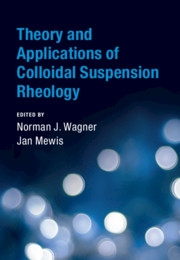Book contents
- Theory and Applications of Colloidal Suspension Rheology
- Cambridge Series in Chemical Engineering
- Theory and Applications of Colloidal Suspension Rheology
- Copyright page
- Dedication
- Contents
- Contributors
- Preface
- General List of Symbols
- Useful Physical Constants and Values
- 1 Introduction to Colloidal Suspension Rheology
- 2 Theory of Colloidal Suspension Structure, Dynamics, and Rheology
- 3 Methods of Colloidal Simulation
- 4 Microstructure under Flow
- 5 Rheology of Colloidal Glasses and Gels
- 6 Suspensions of Soft Colloidal Particles
- 7 Biocolloid Rheology
- 8 Hemorheology
- 9 Applications
- Index
- References
5 - Rheology of Colloidal Glasses and Gels
Published online by Cambridge University Press: 07 April 2021
- Theory and Applications of Colloidal Suspension Rheology
- Cambridge Series in Chemical Engineering
- Theory and Applications of Colloidal Suspension Rheology
- Copyright page
- Dedication
- Contents
- Contributors
- Preface
- General List of Symbols
- Useful Physical Constants and Values
- 1 Introduction to Colloidal Suspension Rheology
- 2 Theory of Colloidal Suspension Structure, Dynamics, and Rheology
- 3 Methods of Colloidal Simulation
- 4 Microstructure under Flow
- 5 Rheology of Colloidal Glasses and Gels
- 6 Suspensions of Soft Colloidal Particles
- 7 Biocolloid Rheology
- 8 Hemorheology
- 9 Applications
- Index
- References
Summary
When the particle concentration and/or the interparticle forces are sufficiently increased, structures with a solid-like response will develop in colloidal systems. This is dealt with in this chapter, mainly for simple systems, comprised of hard or nearly hard spheres with interparticle attractions. Models have been developed for their state diagrams and have been confirmed by a range of experimental techniques. Gel and glass phases can be distinguished. Glasses occur more commonly at sufficiently concentrated suspensions of hard spheres, but also for suspensions of particles with weak attractions. Gelation occurs at lower volume fractions for suspensions with interparticle attractions, which results in either homogeneous (or equilibrium) gels or heterogeneous gels depending on the nature of the forces. The complex rheology of gels and glasses includes nonlinear viscoelasticity, creep, transient start-up shear, yield strain, and stress. Their nonequilibrium nature has significant consequences for their rheology, including time and shear rate effects. Applying shear causes a change in the microstructure, which recovers when the flow is arrested. For glasses this is known as rejuvenation and aging, respectively. Time and shear effects are stronger in gels where more complex microstructures are involved, leading to a more variable, time-dependent, rheological response.
- Type
- Chapter
- Information
- Theory and Applications of Colloidal Suspension Rheology , pp. 173 - 226Publisher: Cambridge University PressPrint publication year: 2021
References
- 8
- Cited by

